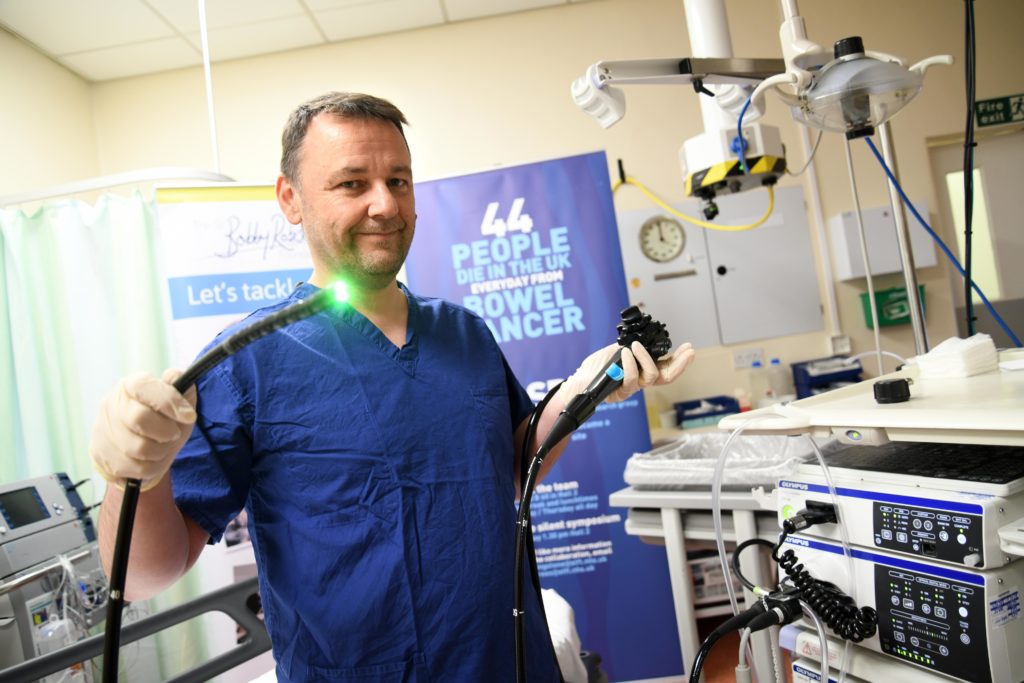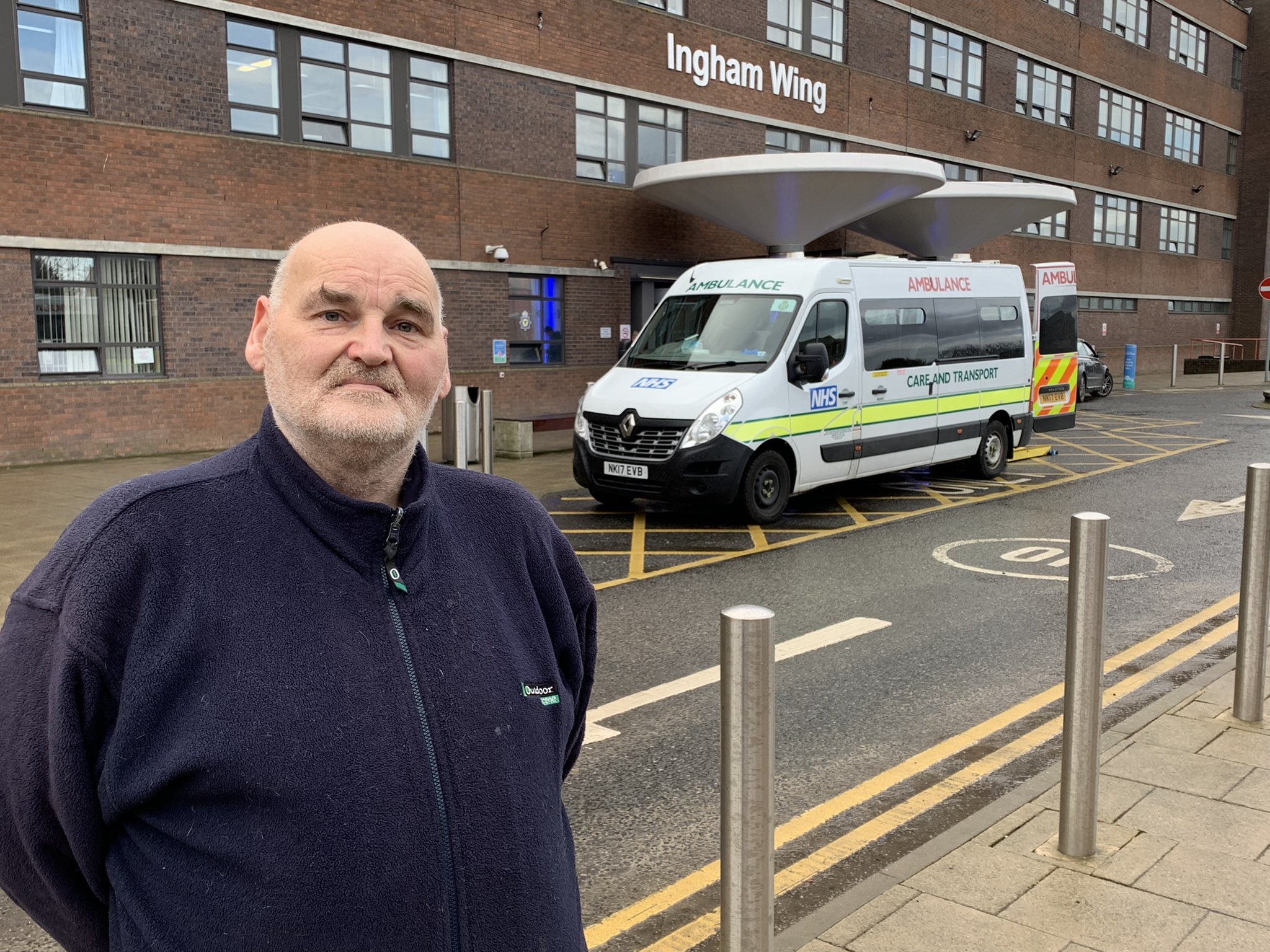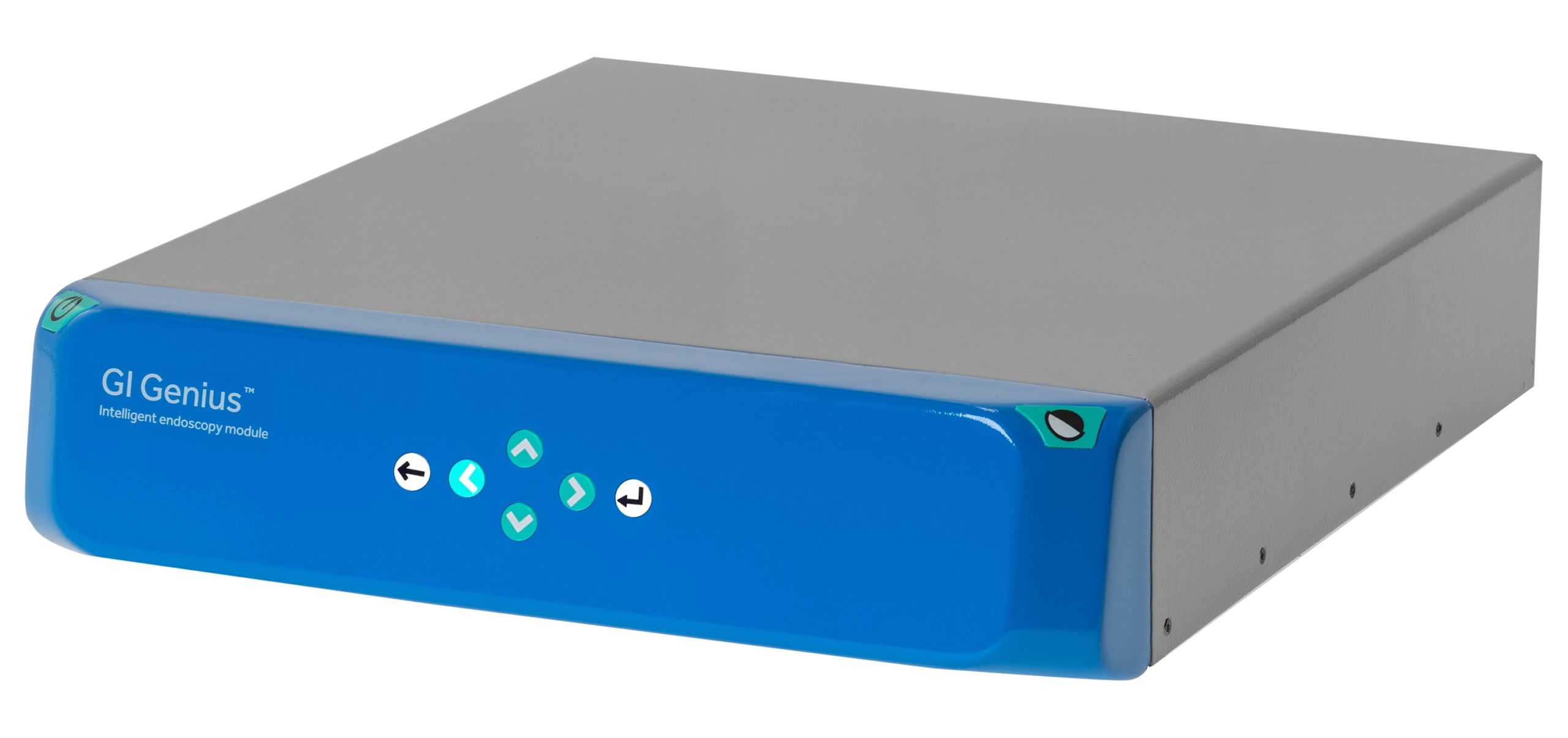The first UK clinical trial of an innovative artificial intelligence (AI) device is underway with the potential to save many lives lost to bowel cancer – with the first 500 patients now through the study.
The ground-breaking study COLO-DETECT is trialling the use of GI Genius, a new AI device designed to help clinicians to identify polyps during colonoscopies (examinations used to detect changes or abnormalities in the bowel (colon and rectum).
 The study is being led by Professor Colin Rees, a Consultant Gastroenterologist at South Tyneside and Sunderland NHS Foundation Trust (STSFT), Professor of Gastroenterology at Newcastle University and one of Europe’s leading experts in endoscopy (the procedure used to diagnose most forms of bowel cancer).
The study is being led by Professor Colin Rees, a Consultant Gastroenterologist at South Tyneside and Sunderland NHS Foundation Trust (STSFT), Professor of Gastroenterology at Newcastle University and one of Europe’s leading experts in endoscopy (the procedure used to diagnose most forms of bowel cancer).
He is working closely alongside Professor Linda Sharp, Professor of Cancer Epidemiology at Newcastle University.
The trial has just reached the milestone of recruiting 500 patients across the nine Trusts taking part in the trial.
Professor Rees, pictured above, said: “Tragically around 16,000 people die from bowel cancer each year, making it the UK’s second biggest cancer killer.
“Bowel cancer rates are very high in the North East – men in this region have the highest bowel cancer incidence rates in England with women also in the upper half of incidence rates.
“Sadly, survival rates for men and women in the North East are also amongst the lowest in the country and the survival rates in the UK are lower than in many other European countries. We want to reduce the number of deaths by diagnosing disease in the bowel before it even becomes cancerous and by finding cancer earlier.”
Dr Laura Neilson, Consultant Gastroenterologist at STSFT, who was the first to recruit a patient into the trial, with 100 people now through its section of the study.
She said: “Bowel cancer is entirely treatable and in many cases curable, especially if it’s diagnosed early – which is why studies like COLO-DETECT are so important.
“COLO-DETECT is without question, world leading research and we are delighted to be the first hospital in the UK to recruit a patient into this trial and to be leading this pioneering research.”
Most bowel cancers develop from a type of polyp – called an adenoma – that becomes cancerous. It is important to find as many polyps as possible to decide whether they need to be removed, as this may prevent a polyp becoming cancerous in the future.
GI Genius integrates with existing colonoscopy equipment and analyses images from the camera in real-time. It highlights any areas it thinks may contain a polyp, these areas can then be inspected more closely to determine if a polyp is present and whether or not it should be removed.
Michael Anthony Watson, 58, from Sunderland, was invited to take part in the study last November as part of investigations after he started experiencing stomach pains.

The COLO-DETECT technology was used during his colonoscopy when it was carried out at South Tyneside District Hospital, where the Trust has set up its trial base, with the AI kit activated as part of the randomised study.
He feared he had cancer, having lost a relative to the disease after they had similar symptoms, however, the checks found he has Terminal ileitis (TI), an inflammatory condition of the small intestine, which is now being treated.
He said: “I do worry about my health and when something’s troubling me, I want to get it checked out.
“They asked me if I wanted to take part in this study and I thought if it is going to benefit me, of course, but I knew it would also benefit others, so anything which could help, I was all for.
“When I went in, they told me the machine was switched on and I wouldn’t have known any different.
“I asked at the end how long it would be before they knew the results and I was told straight away there were no signs of bowel cancer, which was a relief.
“I know they’d also taken some biopsies, so they were still to check, but at least I knew then what they’d seen.
“If anyone else was asked to join in the study, I’d say yes, because you also know it’s going to help other people.”
The £896,000 trial has been funded by Medtronic and will see nine NHS endoscopy units from across the country recruiting more than 2,000 patients over the next 12 months.

The AI technology is housed within a box added to the kit used in endoscopy units.
The participating endoscopy units in COLO-DETECT are:
- South Tyneside and Sunderland NHS Foundation Trust
- Northumbria NHS Healthcare Trust
- North Tees and Hartlepool Hospitals NHS Foundation Trust
- South Tees Hospitals NHS Foundation Trust
- Newcastle-upon-Tyne Hospitals NHS Foundation Trust
- Kettering General Hospital NHS Foundation Trust
- The Royal Wolverhampton NHS Trust
- Bolton NHS Foundation Trust
- University Hospitals of Morecambe Bay NHS Foundation Trust
Patients participating in COLO-DETECT are being identified through another revolutionary bowel cancer project developed in this region.
Funded by the Sir Bobby Robson Foundation, part of Newcastle Hospitals Charity (£985,000), COLO-SPEED (colospeed.uk) is a resource which gives patients from across the North East and Cumbria the opportunity to register to participate in bowel cancer research such as COLO-DETECT.
It includes the development of a novel digital platform, which provides essential tools to support research projects like COLO-DETECT and is used to collect data, feedback results and deliver ongoing patient and public engagement.
COLO-DETECT is the first major industry study attracted to the North East through the COLO-SPEED network.
COLO-SPEED will also enable the project’s delivery more efficiently than would have previously been the case.
Lady Elsie said: “When my husband first launched this Foundation, his aim was to attract world-class cancer research to this region, which would then go on to help across the country and beyond.
“We’re so proud to see this starting with help from COLO-SPEED and I know our charity’s wonderful supporters will join me in wishing everyone involved all the very best. We all want to see research into this disease progressing as quickly as possible.”






